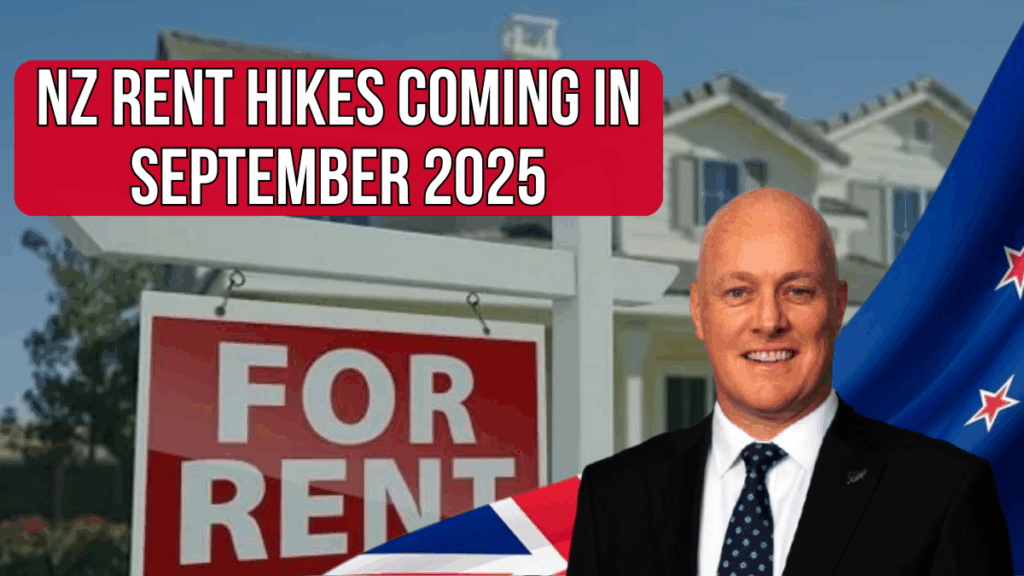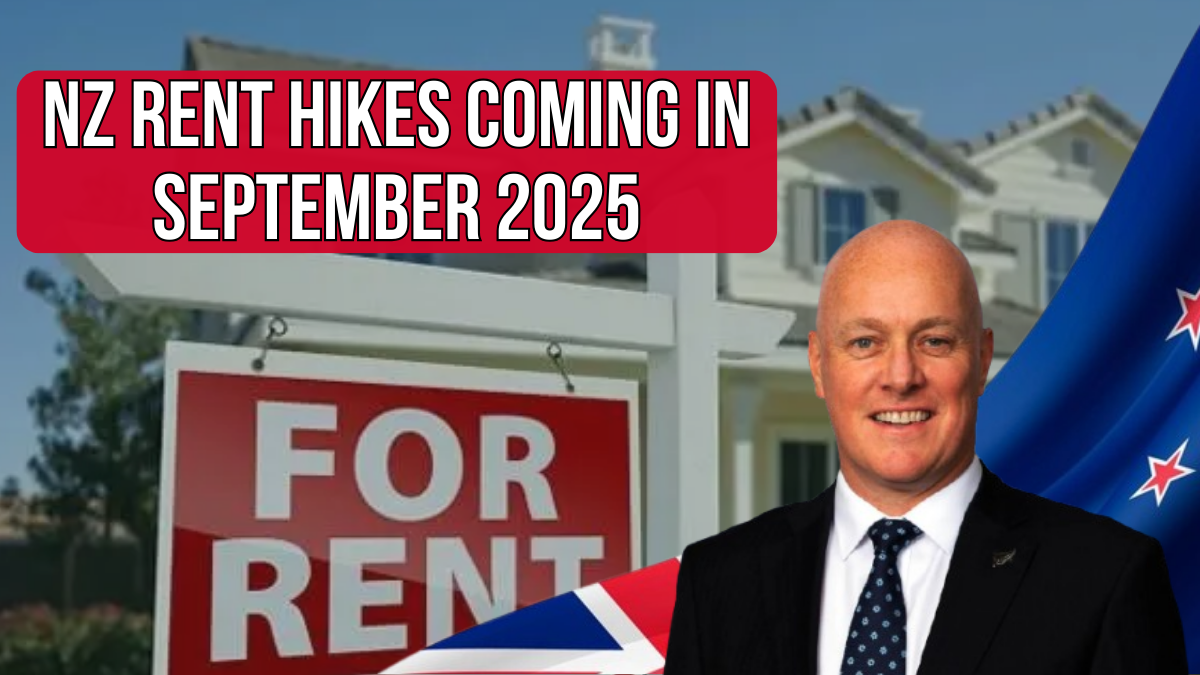Tenants across New Zealand are preparing for significant rent increases in September 2025, after official confirmation that rental adjustments will be implemented nationwide. The increases are tied to inflation, rising property costs, and strong rental demand, particularly in urban centers such as Auckland, Wellington, and Christchurch.

For households already stretched by the cost of living, the September rent hike will introduce further financial challenges, impacting students, working families, and pensioners alike.
This article explains why rents are increasing, how much they are expected to rise, tenant rights under New Zealand law, government responses, and strategies renters can use to manage the change.
Why Rents Are Rising in New Zealand
The September 2025 rent increase is being driven by several economic and policy factors:
- Inflation – Higher costs for electricity, rates, building materials, and services are being passed to tenants.
- Demand Pressure – Urban population growth has increased rental demand, outpacing supply.
- Landlord Mortgage Costs – Rising interest rates on property loans have added pressure on landlords to recover expenses.
- Policy Changes – Adjustments in tax rules and reductions in landlord subsidies have contributed to increased rental prices.
Collectively, these factors make the 2025 rent hikes among the most substantial in recent years.
Quick Summary: NZ Rent Hike September 2025
Detail |
Information |
|---|---|
Implementation Date |
September 2025 |
Average Increase |
4–12% (depending on region) |
Urban Centers |
8–12% increase (Auckland, Wellington, Christchurch) |
Regional Areas |
4–7% increase |
Student Housing |
Up to 15% in high-demand areas |
Legal Notice Period |
Minimum 60 days’ written notice |
Frequency |
Rent can only be increased once every 12 months |
Official Site |
Expected Rent Hike: September 2025
According to estimates from housing analysts and government agencies:
- Urban Centers: 8–12% rise, with Auckland and Wellington tenants likely to face the steepest increases.
- Regional Areas: 4–7% increase, depending on local supply and demand.
- Student Housing: Up to 15% in high-demand areas near universities.
Example: A household currently paying NZ$600 per week may see rents increase by NZ$50–70 weekly, representing NZ$200–280 per month in additional costs.
Impact on Tenants
The 2025 rent hike will bring multiple consequences for households across New Zealand:
- Higher Cost of Living – Rent will consume a larger portion of income, leaving less for essentials.
- Housing Instability – Low-income families may face eviction or be forced to move to cheaper suburbs or regions.
- Student Pressures – Students living near universities will face higher accommodation costs on top of tuition and living expenses.
- Increased Government Dependency – More families will likely apply for housing allowances, rent subsidies, or emergency financial aid.
For many, this increase may force difficult choices between paying for housing, healthcare, food, or utilities.
Government Response
The New Zealand government has acknowledged tenant concerns and outlined potential measures to reduce the impact:
- Accommodation Supplements – Expansion of support for low-income renters.
- Affordable Housing Projects – Fast-tracked construction of social and affordable rental properties.
- Market Oversight – Monitoring rent increases to ensure landlords remain compliant with tenancy laws.
- Tenant Support Services – Providing education on rights, negotiation support, and dispute resolution.
While government action cannot eliminate rent hikes entirely, these measures aim to reduce their burden on households.
Tenant Rights During Rent Increases
Under New Zealand tenancy law, landlords must follow clear rules when increasing rent:
- Notice Period – At least 60 days’ written notice is required before an increase takes effect.
- Frequency Limits – Rent can only be increased once every 12 months for existing tenancies.
- Fair Market Rates – If tenants believe the increase is excessive, they can challenge it through the Tenancy Tribunal.
- Transparency – Rent hike notices must clearly state the new amount, effective date, and compliance with tenancy law.
These rules protect tenants from arbitrary or exploitative increases.
How Tenants Can Prepare for Rent Increases
Facing higher housing costs in September, tenants are encouraged to take proactive steps:
- Budget Ahead – Adjust financial plans to account for higher rent.
- Negotiate with Landlords – Request phased increases or discuss shared property upkeep costs.
- Explore Housing Options – Consider downsizing, relocating to regional areas, or shared accommodation.
- Seek Government Support – Apply for housing supplements if eligible.
- Know Your Rights – Use the Tenancy Tribunal if rent increases appear unjustified.
Being prepared will help tenants reduce the financial strain and avoid unexpected hardships.
Long-Term Housing Market Effects
The September 2025 rent hikes may create ripple effects across the housing sector:
- More Demand for Public Housing – Families may turn to government housing assistance.
- Pressure Toward Homeownership – Rising rents may push some renters to consider buying, even amid high property prices.
- Regional Migration – Tenants may move away from expensive cities, fueling growth in smaller towns.
- Policy Debate – Increased calls for rent caps, stricter landlord rules, and expansion of affordable housing.
The hikes highlight ongoing challenges in balancing rental market demand, affordability, and housing supply.
Frequently Asked Questions (FAQs)
1. When will the rent hikes take effect?
September 2025, after landlords provide at least 60 days’ notice.
2. How much will rent increase by?
Between 4% and 12% on average, depending on location.
3. Can landlords raise rent more than once a year?
No, by law rent can only be increased once every 12 months.
4. What if my rent increase is too high?
You can challenge it at the Tenancy Tribunal.
5. Will there be government support for tenants?
Yes, through expanded accommodation supplements and affordability programs.
Conclusion
The NZ rent hikes scheduled for September 2025 will impact households nationwide, with urban tenants facing increases of 8–12% and regional renters seeing 4–7% rises. Students in high-demand areas may be hit hardest, with rent hikes of up to 15%.
While market forces such as inflation, demand, and mortgage costs are driving these changes, tenant protections and government subsidies will provide some relief. Renters are advised to stay informed, budget carefully, and exercise their tenancy rights to navigate this challenging period.
For More Information Click HERE



